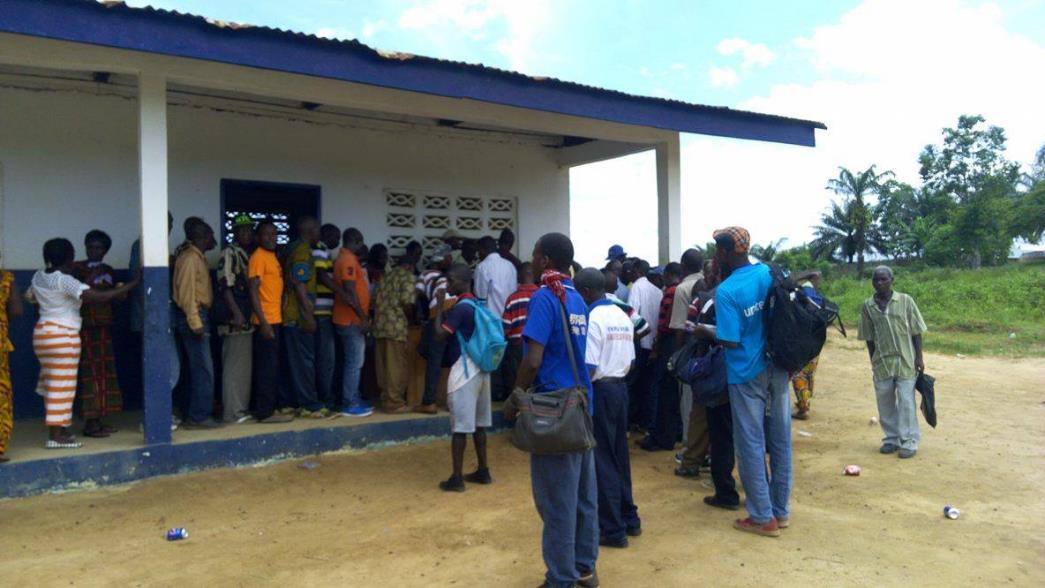YARPAH TOWN, River Cess – Teachers in River Cess will now receive their salaries through Lonestar’s Mobile Money payment system after more than 500 gathered in Yarpah Town on Friday, May 5 to register for the system.
According to Jacob Koviago, a consultant at the County Education Office, the aim of the process is to keep teachers in the classrooms.
“With the mobile money system, teachers will now [stay] in the classroom as compared to the times past,” Koviago said. Because teachers will now receive their money on their mobile phones. They don’t need to pay transportation fares to go to Cestos for pay.”
The Education Sector Analysis, conducted by the Ministry of Education and its partners, identified high levels of teacher absenteeism as a critical challenge facing the sector, citing statistics that attributed 30 percent of teacher absenteeism to issues with collecting pay.
Because of the uniquely rural environment and the lack of many amenities seen in more urban areas, civil servants in River Cess, most of whom are teachers, have over the years faced challenges in getting their salaries.
It sometimes takes a teacher a week to get a month’s salary, as teachers often have to travel a day to get to Cestos. After the payment, the teacher will have to spend the night to start his or her journey the next day. All this time is considered excused absence by the Ministry of Education.
This is why the use of Mobile Money to pay teachers seems to be so promising – it was endorsed by the presidential cabinet. Last year, a pilot of the program saw 67 teachers in Nimba sign on to the program, which was implemented by mStar/Liberia.
In Nimba, the program seemed to have been successful. One teacher at the Tappeh Memorial High School in Tappita, Jacob B. Wazeah, said he previously had to spend L$3000 (US$27) on roundtrip fares between Tappita and Ganta.
In River Cess, questions remain as to whether there are enough vendors in the county to serve the over 500 teachers. There are just three mobile money vendors in the county and it is not yet clear what Lonestar or the ministry plans to do to increase that number.
Teachers may have to travel to Buchanan or other places in order to cash out their money, which would defeat the original purpose of ensuring that teachers stay in the classrooms.
During the pilot phase in Nimba in August of 2016, Clarissa Perkins of mStar/Liberia wrote in an email to The Bush Chicken that the program had targeted a smaller amount of teachers “in order to not overwhelm the network and be sure the [mobile network operator] would be able to provide sufficient liquidity.â€
“If a large number of teachers had been targeted initially, it would have been difficult to address problems from the first disbursements,†Perkins continued.
Liquidity of the Mobile Money agents, meaning whether they have enough cash to pay out to teachers, will be another issue, as civil servants receive their pay at the same time each month.
“Liquidity is a serious issue for all mobile money deployments globally and is unfortunately not one that is easily addressed, particularly in a nascent ecosystem like the one in Liberia,†Perkins wrote about the issue. “There are certain methods to deal with agent liquidity but it is generally on the part of the service provider to address the issue (in this case, Lonestar).â€
“However, knowing that this is an ongoing challenge, we are working with the agents directly to ensure that they are aware of the potential spike in demand for cash and we are setting up systems so that they will be alerted and thus prepared prior to the teachers receiving their payments. We are also searching for and mapping potential points to expand the agent network that has higher cash flows. Finally, we are encouraging mobile payment recipients to use mobile money to pay for goods and services to the extent possible to lessen the cash burden.â€
Koviago noted that Lonestar plans to assign more Mobile Money vendors in the county to ensure that there is enough cash available to pay teachers and that wait times are reasonable.
As for the fees to be paid for use of the Mobile Money service, Koviago said the Ministry of Education would pay half of the service charge, while employees would be responsible for the rest.
“This is reasonable,†he said. “Because if you look at the transportation fares they were paying before, I think this is in the best interest of the teachers.”
The Principal of the Sayuoh Public School, John Flobar, told The Bush Chicken that the new system is good but he sees challenges ahead.
“I like the system, but I think it [will] give us [a] hard time, because [there’s] only one person doing mobile money business here in Yarpah Town,” Flobar said. “There is a need for mobile money business in this place or else we will still face problems.”
Featured photo by Eric Doue



